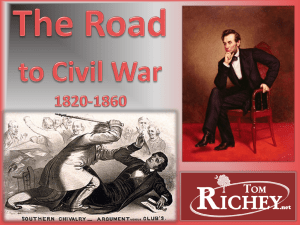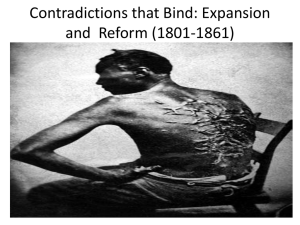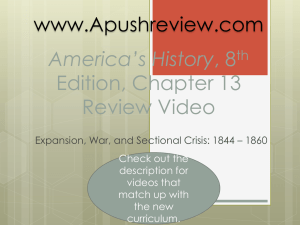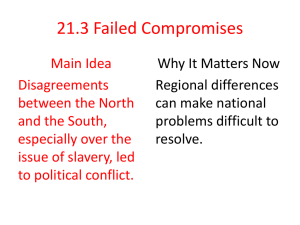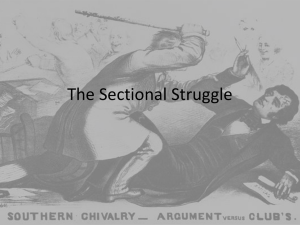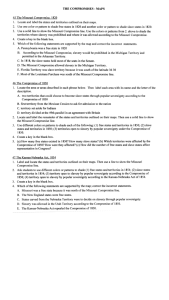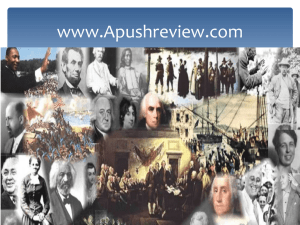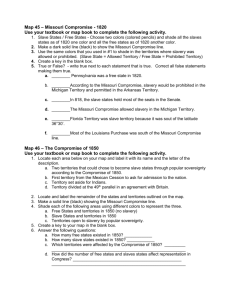Quiz Time!
advertisement
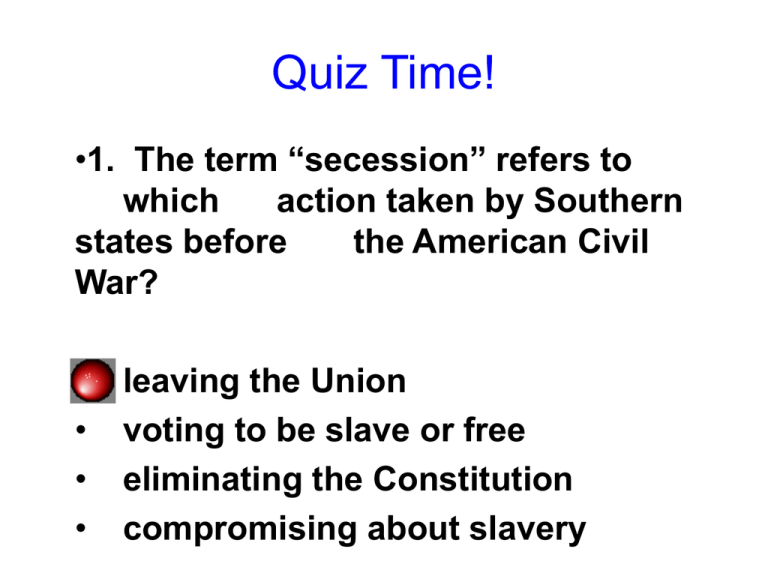
Quiz Time! •1. The term “secession” refers to which action taken by Southern states before the American Civil War? • • • • leaving the Union voting to be slave or free eliminating the Constitution compromising about slavery 2. The presence of the Underground Railroad, as shown in the map below, had the effect of ________ the North and South before the Civil War. unifying dividing joining connecting 3. Who was known as “the Great Compromiser” for his proposal of the Missouri Compromise? Andrew Jackson Henry Clay John C. Calhoun George Washington 4. In 1854, Illinois Senator Stephen Douglas introduced what act, which allowed two new Midwestern states to choose whether they would allow slavery? Missouri Compromise Kansas-Nebraska Act Illinois-Iowa Act Oklahoma-Texas Compromise 5. The Dred Scott v. Sandford Supreme Court decision in 1857 reinforced the idea that slaves had no political rights because they were considered to be which of the following? above the law too partial to be fair mere property uneducated 6. The idea of allowing the people of a territory to decide if it would be slave or free was known as what? Factionalism Abolitionism Popular Sovereignty Constitutional Monarchy 7. From the point of view of many Northerners, John Brown was a________. martyr for a just cause. crazy rebel Southern spy 8. The 1860 presidential candidate whose name did not appear on the ballot in most Southern states was… • • • • John Breckinridge John Bell Abraham Lincoln Stephen Douglas 9. What book by Harriet Beecher Stowe showed slavery as a brutal, cruel system? • • • • Slavery in the South Slavery As It Is Bleeding Kansas Uncle Tom’s Cabin • 10. A Person could be fined up to $1,000 or be imprisoned for breaking the law stated in the _____________. • Fugitive Slave Act • Dred Scott Act • Southern Slave Act Why was the state of Maine admitted into the Union as a free state as part of the Missouri Compromise of 1820? a. b. c. d. it was rejected as a slave state to maintain the balance of power between slave and free states it was too large to be a territory to shift the balance of power in the country to the free states Which of the following completes the table on Congressional Compromises below? Congressional Compromises Before 1861 Missouri Compromise Maine admitted to the Union as a free state ? California admitted to the Union as a free state Banned slavery in the Created new territories of Louisiana Purchase north New Mexico and Arizona of 36°30' a. Rush-Bagot Agreement b. Compromise of 1850 Kansas-Nebraska Act Voided Missouri Compromise Decided slavery issue in Kansas territory c. Declaration of Independence d. Proclamation of 1763 The 36°30' line shown on the map below, which designated slave territory to the South and free territory to the North, was established by what government act? a. the Compromise of 1850 b. the Kansas-Nebraska Act c. the Free/Slave Territory Act d. the Missouri Compromise Who is the U.S. government figure shown and described below? - Vice President under John Adams and Andrew Jackson - Supported states’ rights and nullification - Senator from South Carolina - Supported slavery and the agricultural South before the Civil War - Opposed Compromise of 1850 a. Stephen Douglas b. Daniel Webster c. Henry Clay d. John Calhoun Abolitionists, who were active in the North before the Civil War, believed in what? a. doing away with slavery b.helping slave owners c. helping the aboriginal peoples d.doing away with alcohol The idea of allowing the people of a territory to decide if it would be slave or free was known as what? a. b. c. d. factionalism Abolitionism popular sovereignty constitutional monarchy The issue that lay beneath many of the preCivil War congressional compromises, such as the Compromise of 1850 and the KansasNebraska Act, was what? a. b. c. d. taxation without representation Slavery over-industrialization in the South trade with Europe Refer to the chart listing Historic Quotations. Who said that… Historic Quotations Without their [the people’s] aid it is beyond the power of any President . . . to restore peace and harmony among the States. Wisely limited . . . under our Constitution and laws, he alone can accomplish but little for good or for evil on such a momentous question. (December 1860) Sam Houston You may, after the sacrifice of countless thousands of treasure and hundreds of thousands of precious lives, as a bare possibility, win Southern independence, if God be not against you; but I doubt it. (January 1861) Abraham Lincoln In your hands, my dissatisfied fellow-countrymen, and not in mine, is the momentous issue of civil war. . . . You have no oath registered in Heaven to destroy the government, while I shall have the most solemn one to “preserve, protect, and defend it.” (March 1861) Jefferson Davis Our present condition . . . illustrates the American idea that governments rest upon the consent of the governed, and that it is the right of the people to alter or abolish governments whenever they become destructive of the ends for which they were established. (February 1861) A B C D Daniel Webster Thomas Jefferson James Buchannan George Washington.

